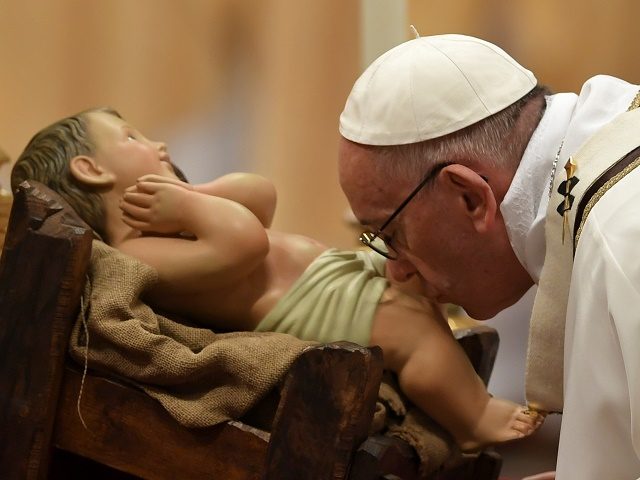Christians need to “liberate” Christmas from materialism, Pope Francis warns, since the holy feast has been “kidnapped” by worldliness.
In his homily at Christmas Mass, the Pope said Christ is often met today with the same indifference that greeted his coming 2,000 years ago, whenever Christmas becomes a holiday centered on us rather than Jesus.
In his denunciation of materialism, Francis said that “the lights of shop windows push the light of God into the shadows” and people can become “enthused about gifts but indifferent to our neighbors in need.”
The Pope contrasted this secularism with the humility and poverty of the first Christmas, when Jesus was born as a defenseless child in a simple stable.
“If we want to celebrate Christmas authentically,” Francis said, “we need to contemplate this sign: the frail simplicity of a tiny newborn child, the meekness with which he is placed in a manger, the tender affection with which he is wrapped in his swaddling clothes. That is where God is.”
The contrast between the modern spirit of commercialism and the humility of Bethlehem represents a paradox, the Pope suggested, which challenges today’s Christians to be countercultural.
The Gospel reveals an apparent contradiction, Francis said, in speaking of “the emperor, the governor, the high and mighty of those times” where God is absent. “He appears not in the splendor of a royal palace, but in the poverty of a stable; not in pomp and show, but in simplicity of life; not in power, but in astonishing smallness.”
God’s self-revelation in poverty and simplicity invites today’s Christians to look for him in the same way, he added.
“In order to meet him, we need to go where he is,” Francis said. “We need to bow down, to humble ourselves, to make ourselves small.”
“The newborn Child challenges us,” he continued. “He calls us to leave behind fleeting illusions and to turn to what is essential, to renounce our insatiable cravings, to abandon our endless yearning for things we will never have.”
Only by leaving these things behind can we discover, in the simplicity of the divine Child, “peace, joy and the luminous meaning of life,” he said.
As he has done in past Christmases, Pope Francis took advantage of the situation to condemn the sin of abortion, which he has likened to King Herod’s slaughter of the innocents in Bethlehem.
“Let us allow ourselves to be challenged by those children who are not allowed to be born,” he said, “by those who cry because no one relieves their hunger, by those who hold in their hands not toys, but weapons.”
Francis said that the mystery of Christmas challenges and unsettles us, because it is both “a mystery of hope and of sadness.”
It has a taste of sadness, because “love is not accepted,” he said, symbolized by Joseph and Mary, who met with closed doors “because there was no place for them in the inn.”
“Jesus was born rejected by some and regarded by many others with indifference,” he said.
On the other hand, Christmas is a feast of joy and hope, he added, because, “for all the darkness in our lives, God’s light shines forth.”
In coming to earth, Jesus offers “the love that brings light to our lives and peace to our hearts,” he said.
The Pope concluded his address by inviting his hearers to “draw close to God who draws close to us.”
“With Mary and Joseph, let us pause before the manger, before Jesus who is born as bread for my life. Contemplating his humble and infinite love, let us simply tell him: Thank you. Thank you because you have done all this for me,” he said.
Follow Thomas D. Williams on Twitter Follow @tdwilliamsrome

COMMENTS
Please let us know if you're having issues with commenting.